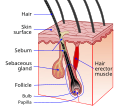Cutibacterium acnes (Propionibacterium acnes) is the relatively slow-growing, typically aerotolerant anaerobic, gram-positive bacterium (rod) linked to...
38 KB (4,116 words) - 04:38, 23 May 2024
Corvec, Stéphane (20 February 2017). "Interaction of Cutibacterium ( formerly Propionibacterium) acnes with bone cells: A step toward understanding bone...
5 KB (229 words) - 15:13, 17 April 2024
is the excessive growth of the bacterium Cutibacterium acnes, which is present on the skin. Treatments for acne are available, including lifestyle changes...
167 KB (18,124 words) - 13:48, 1 June 2024
Skin flora (section Acne vulgaris)
decreased P. acnes colonisation and/or activity. Potential probiotic treatment includes the use of Staphylococcus epidermidis to inhibit P. acnes growth. S...
47 KB (5,190 words) - 01:05, 12 May 2024
causes a rise in sebum and population of Cutibacterium acnes bacteria. The increase in the amount of C acnes or related antigens may trigger the immunologic...
9 KB (939 words) - 16:21, 12 November 2023
Staphylococcus epidermidis (section Acne vulgaris)
S. epidermidis is universally found inside affected acne vulgaris pores, where Cutibacterium acnes is normally the sole resident. Staphylococcus epidermidis...
28 KB (2,880 words) - 07:49, 9 May 2024
glutathione peroxidase system. An example of an aerotolerant anaerobe is Cutibacterium acnes. WI, Kenneth Todar, Madison. "Nutrition and Growth of Bacteria".{{cite...
3 KB (215 words) - 05:30, 7 January 2024
taking advantage of this phenomenon, such as virulent sub-strains of Cutibacterium acnes and irregular migration of Staphylococcus epidermidis from the outer...
4 KB (340 words) - 00:02, 10 April 2024
Sebaceous gland (section Acne)
particularly by the bacteria Cutibacterium acnes. This can inflame the comedones, which then change into the characteristic acne lesions. Comedones generally...
30 KB (3,383 words) - 16:24, 14 April 2024
the melanin pigment, which turns it black. Cutibacterium acnes is the suspected infectious agent in acne. It can proliferate in sebum and cause inflamed...
16 KB (1,682 words) - 17:10, 9 January 2024







